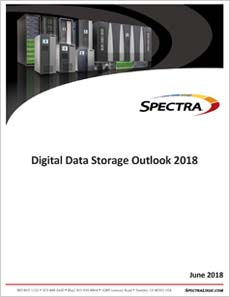
Spectra Logic announced the publication of ?Digital Data Storage Outlook 2018,? the company?s third annual data storage industry report. The report provides insights into the trends, technology and pricing shaping the data storage industry today and into the future. Annual data storage report helps industry anticipate trends, tiers and technologies of the future.
Storage industry experts have forecast that the digital universe could grow to more than 160 zettabytes (ZB) of data by 2025 (IDC).
In the ?Digital Data Storage Outlook 2018? report, Spectra predicts that much of this data may never be stored or will be retained for only a brief time.
The report explores the vital role of digital data in our society, and helps data users navigate the budget and infrastructure challenges of capturing, sharing and preserving data for years to come.
?We are living in an era of keep everything, delete nothing,? said Spectra Logic CEO Nathan Thompson.
?While digital information is clicked, viewed and shared, not everything is protected and preserved for the long term. As the volume of data expands, considerable storage innovation is needed to meet capacity, performance and budgetary requirements. Our report examines today?s technologies, as well as predicts future advancements and availability,? he added.
?Digital Data Storage Outlook 2018? provides an overview of the storage tiers that define long-term storage today and those that will impact the industry tomorrow, including flash, disk, tape, optical and cloud.
Highlights from the report include:
- Spectra estimates a high growth rate for solid-state storage through 2020, followed by steady growth at a lower percentage from 2021-2026.
- By 2020, the disk industry will be serving a singular market, predominately for large IT shops and cloud providers.
- Tape technology has the greatest potential for capacity improvement of all current technologies, with a robust growth path over the next several years.
- Complex workflows and cloud options are prompting IT administrators to consider new strategies regarding ?what? data should be stored ?where? for best practices in data storage and disaster recovery.

